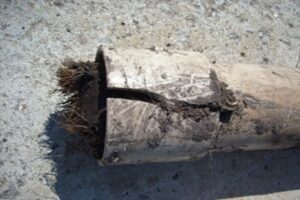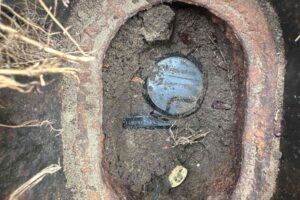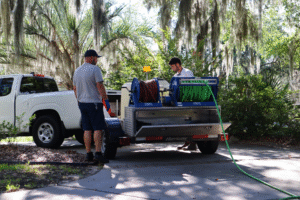A leaky sink is a minor utility issue that, over time, creates major consequences. A kitchen sink leaking hinders hand-washing, dish-washing, and the refilling of water cups and pitchers and brings avoidable spills and injuries. Additionally, having a leaking kitchen sink is bothersome since it impedes the kitchen’s primary functions.
Some kitchen sink leaks are evident, while others are difficult to locate and can drive you insane as you search for them. Any leak under kitchen sink might be difficult to detect. However, they can still result in significant damage.
In this blog, we will discuss the major causes of kitchen sink leaks and how to fix kitchen sink leaks.
What Causes Kitchen Sink Leaking Issues?
1. Water leak around the rim of the sink
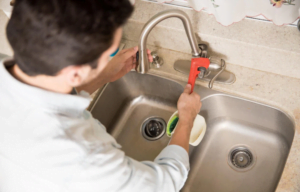
The water under the kitchen sink might leak between the sink and the countertop. To minimize more damage to your kitchen cabinets, you’ll want to solve the problem as soon as possible. Moreover, identifying the cause behind your kitchen sink leak is rather simple.
To check if this issue is causing sink leakage, then drip water over the sink’s rim and watch for leaking below. Moreover, a flashlight can also help to identify water damage. Examine the particleboard for bulging and other signs of damage. It is easy to determine water damage.
If you think this is causing sink leakage, call the plumber immediately.
2. Faucet Leak

Leaks emerging from kitchen faucets are often simple to detect. A frequent sign is if water pools at the sink’s surface whenever the faucet is turned on. Moreover, it is also likely for a faucet leak to flow beneath the sink, making it impossible to detect without looking underneath the counter.
Most faucet leaks are due to defective washers or deteriorated gaskets. You just need to restore them. Occasionally, a serious leak may need you to substitute the whole faucet, which is not very complex.
3. High Water Pressure
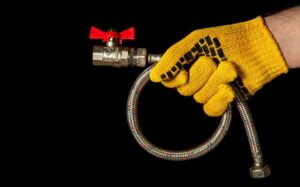
High water pressure is beneficial when you’re using a shower, but it’s less pleasant when it produces a leak. Moreover, there is a greater likelihood of a problem emerging if the water impacts the interior pipes too hard, causing damage to the entire plumbing system.
If the water pressure is very high, your pipes might burst. Also, improper water pressure could result in occasional leaks, including kitchen sink leaking, particularly immediately after water flow.
4. Corroded Valve Seat
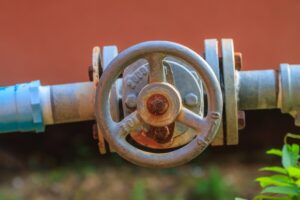
For the pressure mechanism, the valve seat in the kitchen sink joins the spout and the faucet. The presence of excess water at the valve seat might lead to corrosion.
Corrosion occurs when a substance begins to decompose due to chemical interaction. Hence, a corroded valve seat can lead to a kitchen sink leaking. Regularly cleaning the valve seat with the help of an expert will prevent this issue.
5. Loose water supply connection
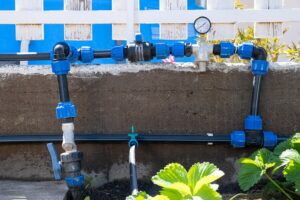
Another reason for the leak under kitchen sink is a loose water supply connection. If the leakage beneath your kitchen sink is continuous, the water supply lines may be faulty. A kitchen sink typically has two water supply lines, but there could be three if the sink has a distinct sprayer. Every water supply connection has the potential to develop a leak and cause issues.
Since most of the connections are covered up, you might not detect the leak unless it has drenched the cabinet and everything is put beneath the sink. A water line leak might be driven by rust or, more often, a faulty connection gasket. In most instances, changing the gasket should be sufficient to stop the leak, but in others, tightening the connection will work.
6. Broken O-Ring

The O-ring is a tiny disc connected to the stem screw that secures your faucet handle.
It is normal for kitchen sinks to leak when the O-ring deteriorates or becomes looser with usage.
To solve that problem, you must remove the O-ring. Yet, it would be prudent to call a plumber to confirm that the O-ring is the source of the problem instead of something more severe.
7. Clogged P-Trap
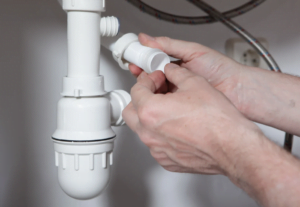
The word P-trap refers to the curved segment of a pipe, often located under the sink drain. So its primary function is to prevent unpleasant odors from permeating the drains. The P-trap is often concealed, making it difficult to identify the kitchen sink leaking immediately.
Over time, trash, microscopic food particles, and muck tend to accumulate in the P-trap. This prevents water from draining properly and may lead to an issue with leaks. Corrosion is another probable reason if your sink is made of metal. So if this is the cause, you may need to entirely replace the trap.
8. Damaged Washer
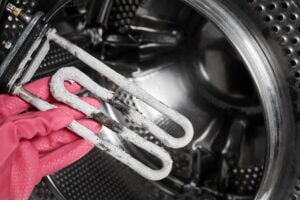
A damaged washer is among the most prevalent reasons for kitchen sink leaking. The washer is forced against the valve seat every time you use the faucet. Continuous friction causes the washers to wear out, at which point you will see leaks around the spout. Leaks in sinks induced by worn-out washer repair are possible by changing the washer. Compression faucets are particularly susceptible to worn-out washers.
9. Drain leak
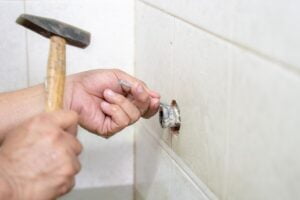
Typically, a drain will include a putty sealant to prevent leakage. If the putty becomes thinner or dries out, the drain could be the source of the leak. Moreover, an old drain may also develop a leak, particularly if it has been heavily used. In this instance, it is prudent to call a professional plumber to fix the drain correctly.
10. Leaking garbage disposer
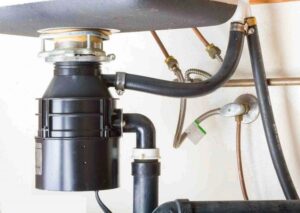
The disposal may be leaking if the pooled water originates primarily from below the trash disposal (if it is located on a separate side of the sink). So this may occur if years of vibration have caused the disposal’s attachment to the sink to loosen. Additionally, the disposal may have leaks around the bottom. In all instances, it is advisable to have a skilled plumber install a new trash disposal.
Final Words
To repair a leak under kitchen sink, you must have the necessary skills and equipment. Before learning how to fix the plumbing beneath the kitchen sink, you must first inspect the area and determine where the water comes from. Instead of opting for DIY kitchen sink leaking repairs, it is always better to call a professional plumber, like Rooter-Man, who can effectively address all your plumbing issues. Contact us today.




